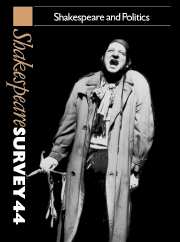Book contents
- Frontmatter
- Shakespeare and Politics
- Language, Politics, and Poverty in Shakespearian Drama
- Some Versions of Coup d’état, Rebellion and Revolution
- Woman, Language, and History in The Rape of Lucrece
- Love in Venice
- Two Kingdoms for Half-a-Crown
- ‘Fashion it thus’: Julius Caesar and the Politics of Theatrical Representation
- ’Demystifying the Mystery of State’: King Lear and the World Upside Down
- Tragedy, King Lear, and the Politics of the Heart
- The Politics of Shakespeare Production
- Shakespeare in the Trenches
- Shakespeare’s Earliest Editor, Ralph Crane
- Shakespeare’s Falconry
- Telling the Story of Shakespeare’s Playhouse World
- Shakespeare Performances in England, 1989–90
- Professional Shakespeare Productions in the British Isles January-December 1989
- Critical Studies
- Shakespeare’s Life, Times, and Stage
- Editions and Textual Studies
- Books Received
- Index
Shakespeare’s Earliest Editor, Ralph Crane
Published online by Cambridge University Press: 28 March 2007
- Frontmatter
- Shakespeare and Politics
- Language, Politics, and Poverty in Shakespearian Drama
- Some Versions of Coup d’état, Rebellion and Revolution
- Woman, Language, and History in The Rape of Lucrece
- Love in Venice
- Two Kingdoms for Half-a-Crown
- ‘Fashion it thus’: Julius Caesar and the Politics of Theatrical Representation
- ’Demystifying the Mystery of State’: King Lear and the World Upside Down
- Tragedy, King Lear, and the Politics of the Heart
- The Politics of Shakespeare Production
- Shakespeare in the Trenches
- Shakespeare’s Earliest Editor, Ralph Crane
- Shakespeare’s Falconry
- Telling the Story of Shakespeare’s Playhouse World
- Shakespeare Performances in England, 1989–90
- Professional Shakespeare Productions in the British Isles January-December 1989
- Critical Studies
- Shakespeare’s Life, Times, and Stage
- Editions and Textual Studies
- Books Received
- Index
Summary
Nicholas Rowe is usually taken to be Shakespeare’s first editor, ‘perhaps’, Gary Taylor suggests, ‘because he is the first we can confidently name’. The reservation rests on his contention that the editing of Shakespeare’s works ‘began with the publication of the first editions of his works in the 1590s’. No doubt this is correct in that the translation of a play from study to print is inevitably accompanied by the alteration of textual details and the addition of such accoutrements as title-pages, dedications, commendatory epistles or poems intended to facilitate purchase and reading. Indeed, we may extend this implicit definition of editing further, to apply it to the kinds of adjustments that are made to a playwright’s text in order to fit it to the stage and the performance which first publishes it abroad. From the moment a playwright stabilizes his conception in a text that embodies his intention for the work in any satisfactory manner, a series of successive destabilizing processes are set in motion. The function if not the purpose of the stage is to appropriate the playwright’s work, willingly relinquished, to represent it in forms that do not respond to the originary moment of creation. On the other hand, publication in print involves a procrustean translation of the work from one arena of performance to another: the attempt to stabilize a final reading text destabilizes the playwright’s original text.
Modern editors are properly aware of these processes for the stabilization of textual variation lies at the heart of their mystery. But in modern times it is not useful to extend the noble title of 'editor' undiscriminatingly to the myriad scribes, book-keepers, compositors, friends of the author or of the press, and printers or publishers who have busied themselves with the text of any of Shakespeare's works. Rowe and his successors from Pope (through to Taylor himself no doubt) conceived that they operated with significantly different methods and objects from those of, for instance, the humble scribe or compositor, and observation that their functions are similar in one or another respect should not obscure recognition of the areas of editorial concern which were not usually shared by early scribes, compositors or, even, publishers of individual works.
- Type
- Chapter
- Information
- Shakespeare Survey , pp. 113 - 130Publisher: Cambridge University PressPrint publication year: 1991



